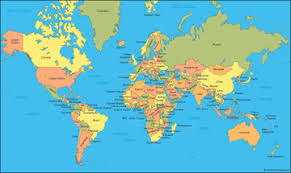Communist Countries in the World – North Korea (DPRK, Democratic People’s Republic of Korea)– Part 04 of 07
A List of Current Communist Countries in the World
:max_bytes(150000):strip_icc():format(webp)/communist-countries-overview-1435178_FINAL2-2d1932314ea14f93904d11691cef8bb1.png)
Thought Co / Melissa Ling
.

During the time of the Soviet Union (1922–1991), communist countries could be found in Eastern Europe, Asia, and Africa. Some of these nations, like the People’s Republic of China, were (and still are) global players in their own right. Other communist countries, such as East Germany, were essentially satellites of the U.S.S.R. that played a significant role during the Cold War but no longer exist.
Communism is both a political system and an economic one. In politics, communist parties have absolute power over governance, and elections are single-party affairs. In economics, the party controls the country’s economic system, and private ownership is illegal, although this facet of communist rule has changed in some countries like China.
By contrast, socialist nations are generally democratic with multi-party political systems. A socialist party does not have to be in power for socialist principles—such as a strong social safety net and government ownership of key industries and infrastructure—to be part of a nation’s domestic agenda. Unlike communism, private ownership is encouraged in most socialist nations.
The basic principles of communism were articulated in the mid-1800s by Karl Marx and Friedrich Engels, two German economic and political philosophers. But it wasn’t until the Russian Revolution of 1917 that a communist nation—the Soviet Union—was born. By the middle of the 20th century, it appeared that communism could supersede democracy as the dominant political and economic ideology. Yet today, only five communist countries remain in the world.
.

.
North Korea (DPRK, Democratic People’s Republic of Korea)
:max_bytes(150000):strip_icc():format(webp)/NorthKoreaFlag-58b9cde05f9b58af5ca7d144.jpg)
Korea was occupied by Japan during World War II, and after the war, it was divided into a Russian-dominated north and an American-occupied south. At the time, no one thought the partition would be permanent, but the division has lasted.
North Korea did not become a communist country until 1945 when South Korea declared its independence from the North, which quickly declared its own sovereignty in return. Backed by Russia, Korean communist leader Kim Il-Sung was installed as leader of the new nation.
The North Korean government doesn’t consider itself communist, even if most world governments do. Instead, the Kim family has promoted its own brand of communism based on the concept of juche (self-reliance).
First introduced in the mid-1950s, juche promotes Korean nationalism as embodied in the leadership of (and cult-like devotion to) the Kims. Juche became official state policy in the 1970s and was continued under the rule of Kim Jong-il, who succeeded his father in 1994, and Kim Jong-un, who rose to power in 2011.
In 2009, the country’s constitution was changed to remove all mention of the Marxist and Leninist ideas that are the foundation of communism, and the very word “communism” was also removed.


Memento MaximaDigital Mktg.
@ [email protected]
RESERVE ADVERTISEMENT
.
NEXT :.
Vietnam (Socialist Republic of Vietnam)
:max_bytes(150000):strip_icc():format(webp)/VietnamFlag-58b9cddd3df78c353c3848f1.jpg)
..


SIGN UP TO RECEIVE OUR EMAILThe most important news of the day about the ASEAN Countries and the world in one email: [email protected]
.









